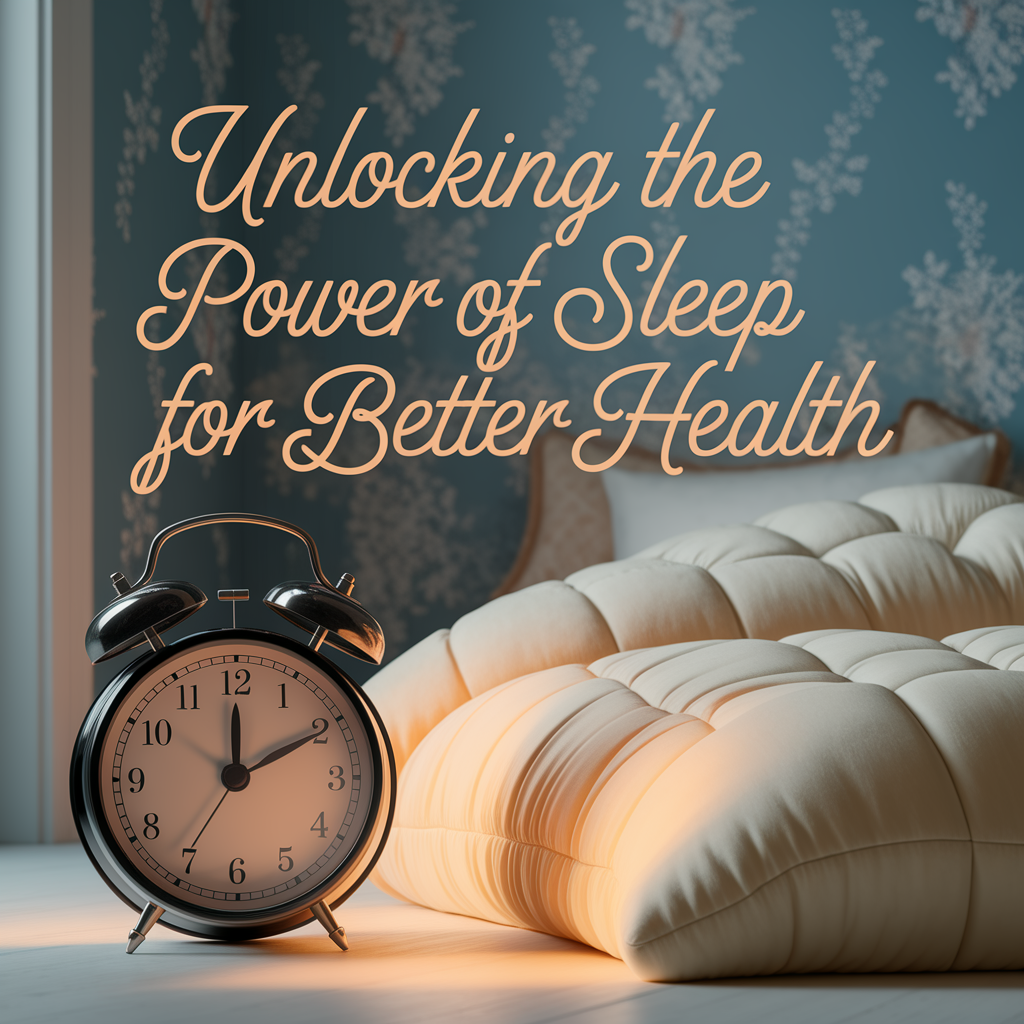Unlocking the Power of Sleep for Better Health
In our fast-paced world, where the hustle and bustle often overshadow our personal needs, sleep has become the unsung hero of health. How many times have we heard someone boast about thriving on just a few hours of sleep? Yet, behind those bragging rights lies a deeper truth: sleep is not just a luxury. It’s an essential pillar of health that many of us overlook. It struck me the other day, as I stumbled through my morning ritual with bleary eyes and a caffeine IV drip, just how crucial sleep is to our overall well-being. Let’s delve into the science and art of sleep, exploring how it can transform our health in ways we might not even realize.
The Science of Sleep
Sleep is a complex, dynamic process that plays a vital role in our physical and mental health. During sleep, our bodies undergo a series of restorative processes. The brain consolidates memories, the body repairs tissues, and essential hormones are released. Notably, the two main types of sleep—REM (rapid eye movement) and non-REM—each serve unique functions.
Non-REM sleep, which includes stages of light and deep sleep, is where physical restoration happens. This is the time our bodies mend muscles, synthesize proteins, and release growth hormones. On the other hand, REM sleep is critical for emotional regulation and cognitive function. It’s during REM that our brains process information and emotions—so when you wake up feeling cranky, you might want to consider how much REM sleep you actually got the night before.
The Impact of Sleep Deprivation
Ah, the dreaded sleep deprivation. A significant number of adults report not getting enough sleep each night—experts recommend 7-9 hours for optimal health. But what happens when we skimp on those precious hours? The consequences can be profound.
- Physical Health: Chronic sleep deprivation is linked to a higher risk of various health issues, including heart disease, obesity, and diabetes. Studies suggest that lack of sleep can disrupt insulin sensitivity, leading to higher blood sugar levels.
- Mental Health: Sleep deprivation has been shown to exacerbate anxiety, depression, and stress-related disorders. It’s almost a cruel joke—when you’re stressed, you can’t sleep, and when you can’t sleep, you’re more stressed.
- Cognitive Function: Those late-night Netflix binges might be entertaining, but they can wreak havoc on your concentration and decision-making skills. Research indicates that sleep-deprived individuals perform worse on tasks requiring attention and alertness.
Let’s not forget the personal anecdotes here. I remember once attempting to power through a deadline after a night of barely any sleep. My brain felt like it was wading through molasses. I typed an entire paragraph only to realize I had misspelled my own name. Sleep—or the lack thereof—can truly turn our sharpest tools into dull blades.
Understanding Sleep Needs
It’s essential to recognize that sleep needs can differ from person to person. While the average adult requires somewhere between 7-9 hours of sleep, some may function well on less, while others may need more. Factors such as age, lifestyle, and overall health play a significant role in determining how much sleep you need.
For instance, teenagers require more sleep—often around 8-10 hours—because their bodies are in a critical growth phase. On the contrary, older adults may find their sleep needs shift, with many reporting that they sleep less but often feel just as rested. It’s fascinating, isn’t it? Sleep is not a one-size-fits-all solution. We all have our own unique rhythms and needs.
Creating Your Sleep Sanctuary
Now that we’ve established the importance of sleep, how do we ensure we get enough of it? A good night’s sleep starts long before your head hits the pillow. Creating a sleep sanctuary can significantly enhance the quality of your sleep. Here are some tips to consider:
- Keep it Dark: Light can interfere with your body’s natural sleep-wake cycle. Invest in blackout curtains or a sleep mask to block out unwanted light.
- Optimal Temperature: The ideal sleeping temperature is generally around 60-67 degrees Fahrenheit. A cool room can help facilitate sleep.
- Noise Control: If you live in a noisy area, consider white noise machines or earplugs to drown out disruptive sounds.
- Comfortable Bedding: Invest in a good-quality mattress and pillows that are appropriate for your sleeping position.
Creating this sanctuary may seem like a chore, but let me tell you—it’s worth it. I remember transitioning to a new mattress after years of tossing and turning on a lumpy relic of the past. It was like moving from a bumpy dirt road to a smooth highway. My sleep improved almost instantly.
Establishing a Sleep Routine
Just like a child thrives on routine, adults benefit significantly from establishing a consistent sleep schedule. Going to bed and waking up at the same time every day helps regulate your body’s internal clock. This practice can lead to more restful and rejuvenating sleep.
Consider these routine-building strategies:
- Wind Down: Create a pre-sleep ritual, such as reading a book or taking a warm bath to signal to your body that it’s time to relax.
- Limit Screen Time: The blue light emitted by screens can interfere with the production of melatonin, the hormone that regulates sleep. Try to avoid screens at least an hour before bed.
- Mindfulness and Relaxation: Techniques such as meditation, deep breathing, or gentle yoga can help calm your mind and prepare you for sleep.
Ah, the allure of the phone in bed. I confess, I’ve been guilty of scrolling through social media late at night, only to regret it the next day when my alarm blares. Implementing a screen-free hour might just save you from the groggy morning struggle.
The Role of Nutrition and Exercise
What we eat and how we move can significantly affect our sleep quality. Nutritional choices can either enhance or hinder our ability to fall and stay asleep. For instance, heavy meals or spicy foods close to bedtime can disrupt sleep, while lighter snacks—like bananas or almonds—might help promote it.
Exercise is another crucial player in the sleep game. Regular physical activity is linked to improved sleep quality and duration. However, timing is essential. While morning workouts can energize and set a positive tone for the day, exercising too close to bedtime can be stimulating and make it harder to fall asleep.
Sleep and Mental Health
We can’t overlook the profound relationship between sleep and mental health. Sleep issues often coexist with mental health disorders—think anxiety, depression, and bipolar disorder. It’s almost a vicious cycle; sleep problems can exacerbate mental health issues, and mental health issues can lead to sleep problems.
Studies indicate that treating sleep issues can lead to improvements in mental health. Simple interventions like cognitive-behavioral therapy for insomnia (CBT-I) can help break this cycle. In my experience, discussing sleep habits with friends often reveals a shared struggle. We bond over our mutual desire for that elusive, blissful night of uninterrupted slumber.
When to Seek Help
Sometimes, despite our best efforts, sleep problems persist. If you find yourself consistently struggling to fall asleep or stay asleep, it may be time to consult a healthcare professional. Conditions such as sleep apnea, restless leg syndrome, or chronic insomnia require specialized attention.
- Sleep Apnea: Characterized by pauses in breathing during sleep, this can lead to fragmented sleep and a host of other health issues.
- Restless Leg Syndrome: This condition causes uncomfortable sensations in the legs, often leading to difficulty falling asleep.
- Chronic Insomnia: If you struggle with sleep at least three times a week for three months or longer, seeking help is advisable.
It can be daunting to admit that we need help with something as fundamental as sleep. But, as I’ve learned, there’s no shame in seeking support. After all, we all deserve to experience the restorative power of sleep.
Final Thoughts
Unlocking the power of sleep is not merely about counting sheep or enforcing strict bedtime rules. It’s about understanding the intricacies of our sleep needs, creating an environment that promotes restful slumber, and taking care of our bodies and minds. In a world that often glorifies the grind, let’s not forget that prioritizing sleep is not an indulgence—it’s a necessity.
So, the next time you find yourself tempted to sacrifice sleep for another episode or an early morning deadline, remember this: a well-rested mind and body can tackle challenges far more effectively than one that’s running on empty. Trust me, your future self will thank you for making sleep a priority.
As we navigate the complexities of modern life, let’s not forget the simplest yet most profound truth: sleep is a powerful ally in our quest for better health. So go ahead, embrace the beauty of sleep, and unlock its potential for a healthier, happier you.






